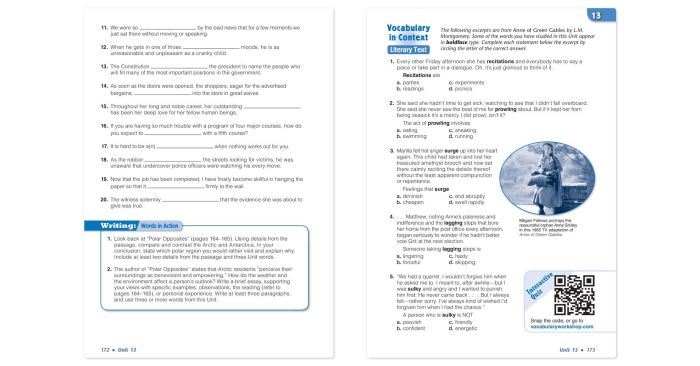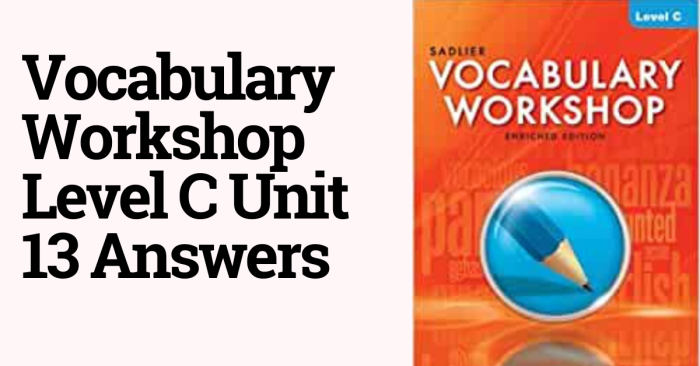Welcome to Vocabulary Workshop Unit 13 Level C, where we embark on a linguistic adventure to expand your vocabulary and enhance your communication abilities. This unit is meticulously designed to provide you with a comprehensive understanding of vocabulary enrichment, word study, contextual vocabulary, and vocabulary practice, empowering you to master the nuances of the English language.
As we delve into the intricacies of word study, you will discover the fascinating world of etymology and morphology, unlocking the secrets behind the origins and structures of words. The concept of contextual vocabulary will shed light on the dynamic relationship between words and their surrounding context, empowering you to decipher word meanings with greater accuracy.
Vocabulary Enrichment: Vocabulary Workshop Unit 13 Level C

Expanding one’s vocabulary is crucial for effective communication and intellectual growth. A rich vocabulary enables individuals to express themselves precisely, comprehend complex texts, and engage in meaningful conversations.
To improve vocabulary, various strategies can be employed. One effective method is reading widely and actively. Exposing oneself to diverse texts, both fiction and non-fiction, helps encounter new words and phrases. Paying attention to context and inferring meaning from surrounding words can facilitate comprehension.
Using a Thesaurus, Vocabulary workshop unit 13 level c
A thesaurus is an invaluable tool for vocabulary enrichment. It provides synonyms and antonyms for words, helping expand one’s lexical range. By exploring alternative words and their nuances, individuals can enhance their writing and speaking abilities.
Word Study
Word study involves examining and analyzing words to understand their meaning, origin, and structure. It encompasses various methods, including etymology and morphology, and emphasizes the role of context in comprehending word meaning.
Etymology
Etymology explores the historical development and origin of words. By tracing the evolution of words through their roots and languages of origin, etymology provides insights into their current meanings and usage.
Morphology
Morphology focuses on the internal structure of words, examining how they are composed of morphemes, the smallest units of meaning. By analyzing morphemes, prefixes, suffixes, and root words, morphology helps understand how words are formed and related to each other.
Role of Context
Context plays a crucial role in understanding word meaning. The surrounding words, sentences, and paragraphs provide clues that help disambiguate word meanings. By considering the context, readers can infer the intended meaning of words, even if they are unfamiliar with their specific definitions.
Contextual Vocabulary

Contextual vocabulary refers to the understanding of words based on their context, rather than relying solely on their dictionary definitions. Context can significantly influence word meaning, as words can take on different shades of meaning depending on the surrounding text.
To determine word meaning from context, consider the following strategies:
Inferring Meaning from Surrounding Text
- Examine the sentence or paragraph where the unfamiliar word appears.
- Identify any synonyms, antonyms, or examples provided.
- Look for clues from the tone, mood, or setting of the text.
Using Context Clues
- Definition: The word’s meaning is directly stated in the text.
- Synonym: The word’s meaning is expressed through a word with a similar meaning.
- Antonym: The word’s meaning is expressed through a word with an opposite meaning.
- Example: The word’s meaning is illustrated through a specific instance.
Vocabulary Practice
Effective vocabulary practice enhances word comprehension and retention. By engaging in diverse activities, learners can strengthen their vocabulary skills, improve their communication abilities, and broaden their knowledge base.
To facilitate this process, a variety of practice strategies can be implemented:
Design Activities for Practicing Vocabulary Skills
- Interactive Games:Word puzzles, crosswords, and charades encourage active engagement with vocabulary words, promoting recognition and recall.
- Writing Exercises:Sentence completion, story writing, and vocabulary logs provide opportunities for learners to apply vocabulary words in context, enhancing comprehension and usage.
- Oral Activities:Discussions, debates, and role-playing scenarios facilitate vocabulary acquisition through real-world applications, fostering fluency and confidence.
Organize Vocabulary Games and Exercises
Regular practice is essential for vocabulary retention. To ensure consistent engagement, vocabulary games and exercises can be incorporated into classroom lessons or assigned as homework:
- In-Class Games:Divide learners into teams for competitive vocabulary challenges, creating a fun and interactive learning environment.
- Homework Assignments:Assign vocabulary lists with corresponding exercises, such as matching, fill-in-the-blank, or word definitions, for independent practice.
- Online Platforms:Utilize online vocabulary games and exercises to supplement in-class activities and provide additional practice opportunities.
Create a Vocabulary Journal for Tracking Progress
A vocabulary journal serves as a valuable tool for learners to monitor their progress and reflect on their vocabulary development:
- Word Collection:Encourage learners to record new vocabulary words along with their definitions, synonyms, and antonyms.
- Usage Tracking:Have learners note the context in which they encountered the word and track their usage over time.
- Self-Reflection:Provide prompts for learners to reflect on their vocabulary acquisition strategies and identify areas for improvement.
Vocabulary Assessment

Vocabulary assessment is an integral part of evaluating students’ language proficiency. It measures their knowledge and understanding of words, which is essential for effective communication.
There are various methods for assessing vocabulary knowledge, including:
Objective Tests
- Multiple-choice tests:Students choose the correct meaning of a word from a list of options.
- Cloze tests:Students fill in missing words in a text based on context.
- Matching tests:Students match words with their definitions or synonyms.
Subjective Tests
- Written essays:Students write essays using a specific vocabulary list or incorporating new vocabulary.
- Oral presentations:Students present speeches or engage in discussions using targeted vocabulary.
Strategies for Improving Vocabulary Test Scores
- Regular reading:Expose yourself to a variety of texts to encounter new words and their usage.
- Use flashcards:Create flashcards with new words and their definitions, and practice regularly.
- Engage in word games:Play games like Scrabble or crossword puzzles to reinforce vocabulary knowledge.
- Use a dictionary or thesaurus:Look up unfamiliar words to understand their meaning and identify synonyms.
- Attend to word parts:Analyze words for prefixes, suffixes, and root words to derive their meaning.
FAQ Summary
What is the importance of vocabulary expansion?
Expanding your vocabulary is crucial for effective communication, critical thinking, and academic success. A rich vocabulary allows you to express yourself with precision, comprehend complex texts, and engage in meaningful conversations.
How can I improve my vocabulary?
There are several strategies to improve your vocabulary, such as reading widely, using a thesaurus, playing word games, and engaging in vocabulary-building exercises.
What is the role of context in understanding word meaning?
Context plays a vital role in understanding word meaning. The surrounding words, phrases, and sentences provide clues that help us determine the intended meaning of a word in a specific situation.